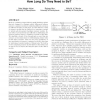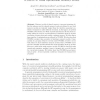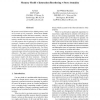CAV
2012
Springer
13 years 4 months ago
2012
Springer
The growing complexity of hardware optimizations employed by multiprocessors leads to subtle distinctions among allowed and disallowed behaviors, posing challenges in specifying th...
130
click to vote
DAC
2011
ACM
14 years 1 months ago
2011
ACM
Memory consistency litmus tests are small parallel programs that are designed to illustrate subtle differences between memory consistency models by exhibiting different outcomes...
ENTCS
2010
14 years 11 months ago
2010
This paper discusses four store-based concrete memory models. We characterize memory models by the class of pointers they support and whether they use numerical or symbolic offset...
118
click to vote
ISOLA
2010
Springer
15 years 16 days ago
2010
Springer
Abstract. Memory models of shared memory concurrent programs define the values a read of a shared memory location is allowed to see. Such memory models are typically weaker than t...
118
click to vote
NIPS
1993
15 years 3 months ago
1993
We propose a learning algorithm for a variable memory length Markov process. Human communication, whether given as text, handwriting, or speech, has multi characteristic time scal...
SPAA
1998
ACM
15 years 6 months ago
1998
ACM
We present a computation-centric theory of memory models. Unlike traditional processor-centric models, computation-centric models focus on the logical dependencies among instructi...
102
click to vote
HICSS
1999
IEEE
15 years 6 months ago
1999
IEEE
The behavior of Distributed Shared Memory Systems is dictated by the Memory Consistency Model. Several Memory Consistency Models have been proposed in the literature and they fit ...
103
click to vote
SPAA
2010
ACM
15 years 6 months ago
2010
ACM
Transactional memory (TM) has shown potential to simplify the task of writing concurrent programs. Inspired by classical work on databases, formal definitions of the semantics of...
ISCA
2006
IEEE
15 years 8 months ago
2006
IEEE
We present a novel framework for defining memory models in terms of two properties: thread-local Instruction Reordering axioms and Store Atomicity, which describes inter-thread c...
110
click to vote
CC
2010
Springer
15 years 9 months ago
2010
Springer
The problem of locally transforming or translating programs without altering their semantics is central to the construction of correct compilers. For concurrent shared-memory progr...





